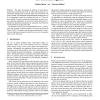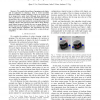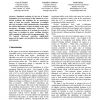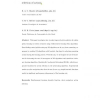139 search results - page 14 / 28 » The Introspective Robot: Using Self-Prediction to Improve Ro... |
ECAI
2000
Springer
14 years 7 days ago
2000
Springer
This paper investigates the problem of improving the performance of general state-of-the-art robot control systems by autonomously adapting them to specific tasks and environments...
ICRA
2010
IEEE
13 years 6 months ago
2010
IEEE
— We consider the problem of grasping novel objects and its application to cleaning a desk. A recent successful approach applies machine learning to learn one grasp point in an i...
ICRA
2005
IEEE
14 years 1 months ago
2005
IEEE
— To realize natural human-robot interactions and investigate the developmental mechanism of human communication, an effective approach is to construct models by which a robot im...
CEC
2005
IEEE
13 years 10 months ago
2005
IEEE
Simulated evolution by the use of Genetic Algorithms (GA) is presented as the solution to a twofaceted problem: the challenge for an autonomous agent to learn the reactive componen...
HEURISTICS
2008
13 years 8 months ago
2008
This paper investigates how to make improved action selection for online policy learning in robotic scenarios using reinforcement learning (RL) algorithms. Since finding control po...




